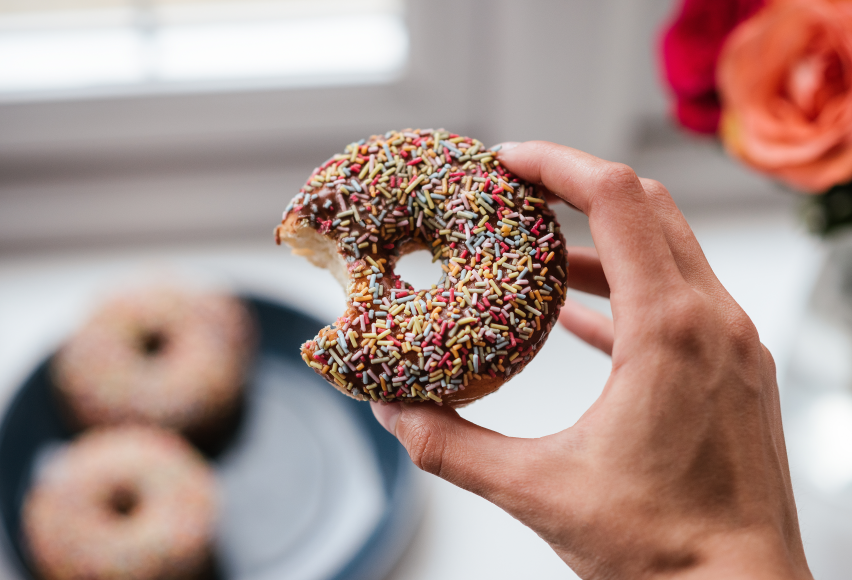The Sugar Connection: What You Need to Know About Sugar and Skin Picking

Online test
Find out the severity of your symptoms with this free online test
You’ve probably heard that saying, you are what you eat. Of course, you wouldn’t literally be a cheeseburger if you ate one, but you might be affected by what’s in it. One thing that science has consistently shown is that diet has a significant impact on how well our body functions. In fact, has been correlated with a number of health issues including heart disease, diabetes, cancer and even pain management.
What might surprise you is that diet has also been linked to mental health too. Research has found diet, especially the typical “Western diet” high in processed food, to play a role in mental health issues including depression, mild cognitive impairment, and ADHD.
Diet may play in the development of body focused repetitive behaviors (BFRBs) like skin picking too. While the exact cause of skin picking is fully understood, it is thought to be influenced by neurobiological factors, genetics, and environmental factors. While we can’t change genetics, we can impact our neurobiological processes through diet. Diet has been found to affect brain processes such as regulation of neurotransmitters, synaptic transmission, and membrane fluidity, all important to optimal cognitive functioning.
Skin Picking and Diet
Particularly relevant to skin picking is the influence of diet on impulsivity (i.e., inappropriate, premature, unduly thought out, and risky behaviors leading to unwanted outcomes) and compulsivity (i.e., broadly defined as a tendency toward repetitive, habitual actions, which an individual feels compelled to perform). Both poor diet, especially high sugar intake, has been linked to impulsive/compulsive symptoms in a number of mental health issues including ADHD and binge eating, both of which as common comorbidities with skin picking. BFRBs have impulsive/compulsive features, such as impaired response inhibition and ritualized behaviors, and often occur with other disorders with similar features.
Sugar, Saturated Fat and Skin Picking
A 2021 study took a closer look at the role a highly processed diet, in particular the effects of sugar and saturated fats, might have on the impulsivity and compulsivity associated with skin picking.
- A diet high in sugar was associated with increases in compulsivity and one feature of impulsivity (non-planning).
- A high fat and sugar diet was associated with a different type of impulsivity (motor impulsivity).
- Diet was not found to affect the severity of picking symptoms. The findings suggest that past-year dietary intake may affect impulsivity, and compulsivity does not appear to contribute to past-week variation in BFRB symptom severity itself.
What Does This Mean for Managing Skin Picking?
These findings add to the growing body of evidence that diet can substantially impact mental health and well-being. They support the need for a more holistic approach to care that includes not only clinical symptoms but also lifestyle practices that may impact symptoms, treatment outcomes, and quality of life. The study authors suggest that given what is known about dietary impacts, reducing sugar and saturated fats in people with BFRBs might possibly reduce both impulsivity and compulsivity, but to what extent and to what end remains unknown.
What can this information mean for you? Understanding how food affects you physically and mentally can help you to make sound decisions about your diet. Making simple changes can yield big results.
- Choose whole, unprocessed foods when you can.
- Limit sugar intake.
- Limit saturated fats.
- Pay attention to how you feel after meals. Does your diet affect your skin picking symptoms?
While more research is needed, there is evidence that diet can influence health and well-being in many ways. Healthy lifestyle practices can be an important part of a comprehensive treatment plan. If you’re wondering how diet may affect your skin picking, have a conversation with your therapist. Together you can decide what steps are right for you.
References
1. Healthy diet. (2019, November 15). World Health Organization (WHO). https://www.who.int/health-topics/healthy-diet#tab=tab_1
2. Lachance, L., & Ramsey, D. (2015). Food, mood, and brain health: implications for the modern clinician. Missouri medicine, 112(2), 111–115. https://pmc.ncbi.nlm.nih.gov/articles/PMC6170050/
3. Gómez-Pinilla F. (2008). Brain foods: the effects of nutrients on brain function. Nature reviews. Neuroscience, 9(7), 568–578. https://pmc.ncbi.nlm.nih.gov/articles/PMC2805706/
4. Farsad-Naeimi, A., Asjodi, F., Omidian, M., Askari, M., Nouri, M., Pizarro, A. B., & Daneshzad, E. (2020). Sugar consumption, sugar sweetened beverages and Attention Deficit Hyperactivity Disorder: A systematic review and meta-analysis. Complementary therapies in medicine, 53, 102512. https://pubmed.ncbi.nlm.nih.gov/33066852/
5. Kaisari, P., Dourish, C. T., Rotshtein, P., & Higgs, S. (2018). Associations Between Core Symptoms of Attention Deficit Hyperactivity Disorder and Both Binge and Restrictive Eating. Frontiers in psychiatry, 9, 103. https://pubmed.ncbi.nlm.nih.gov/29651258/
6. Grant, J. E., Valle, S., & Chamberlain, S. R. (2021). Nutrition in Skin Picking Disorder and Trichotillomania. Frontiers in psychiatry, 12, 761321. https://pmc.ncbi.nlm.nih.gov/articles/PMC8650212/
Online test
Find out the severity of your symptoms with this free online test
Start your journey with SkinPick
Take control of your life and find freedom from skin picking through professional therapy and evidence-based behavioral techniques.
Start Now



